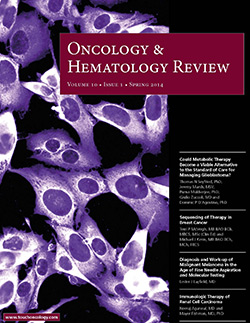ONCOLOGY & HEMATOLOGY (US) – VOLUME 10 ISSUE 1 – SPRING 2014
Welcome to the spring edition of Oncology & Hematology Review (US ). This edition features concise and knowledgeable review articles covering key topics in the current research landscape. New approaches to glioblastoma are discussed by Dr Seyfried, and Drs Fishman and Agarwal explore the place of immunologic therapy in renal cell carcinoma. Further articles in the areas of head and neck cancer, melanoma, breast cancer, colorectal cancer, prostate cancer, and radiotherapy are also included. We hope you find this issue useful and that it provides helpful information and discussions that are relevant to your practice and interests. Please peruse and enjoy the expert content and we welcome any feedback you may have.







